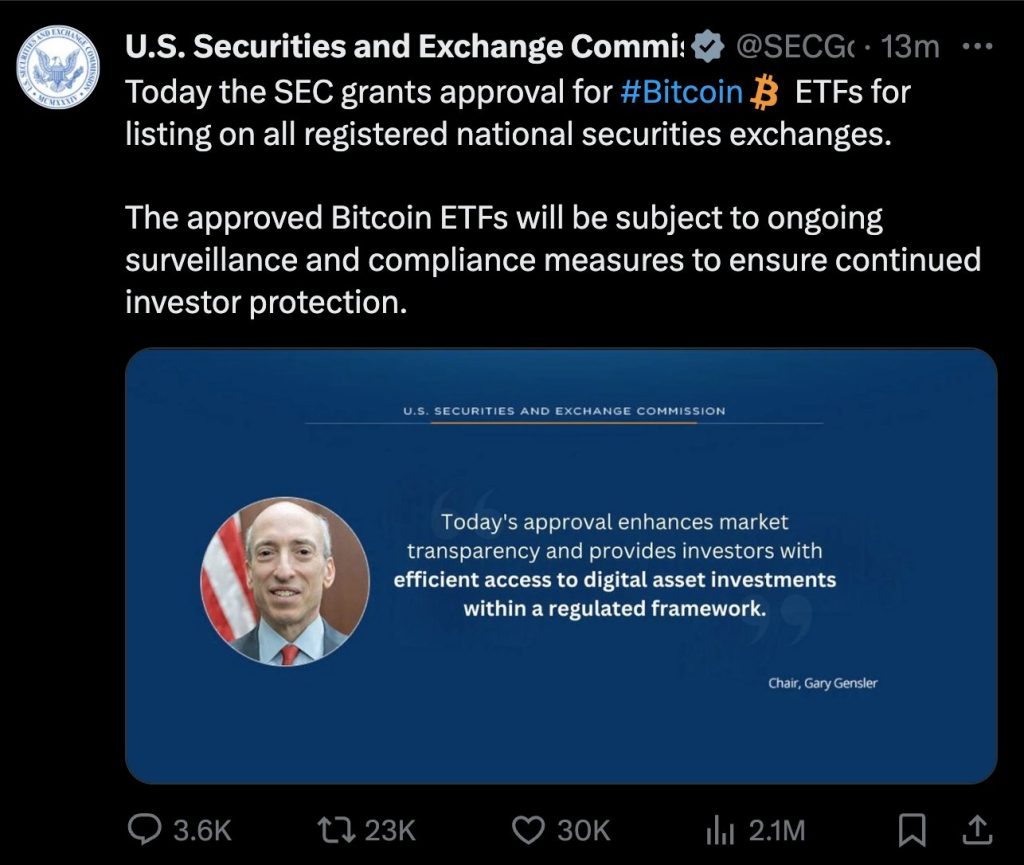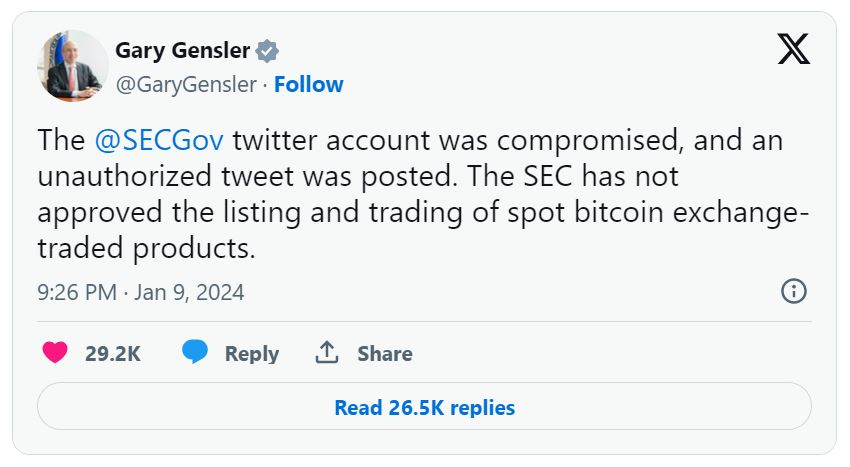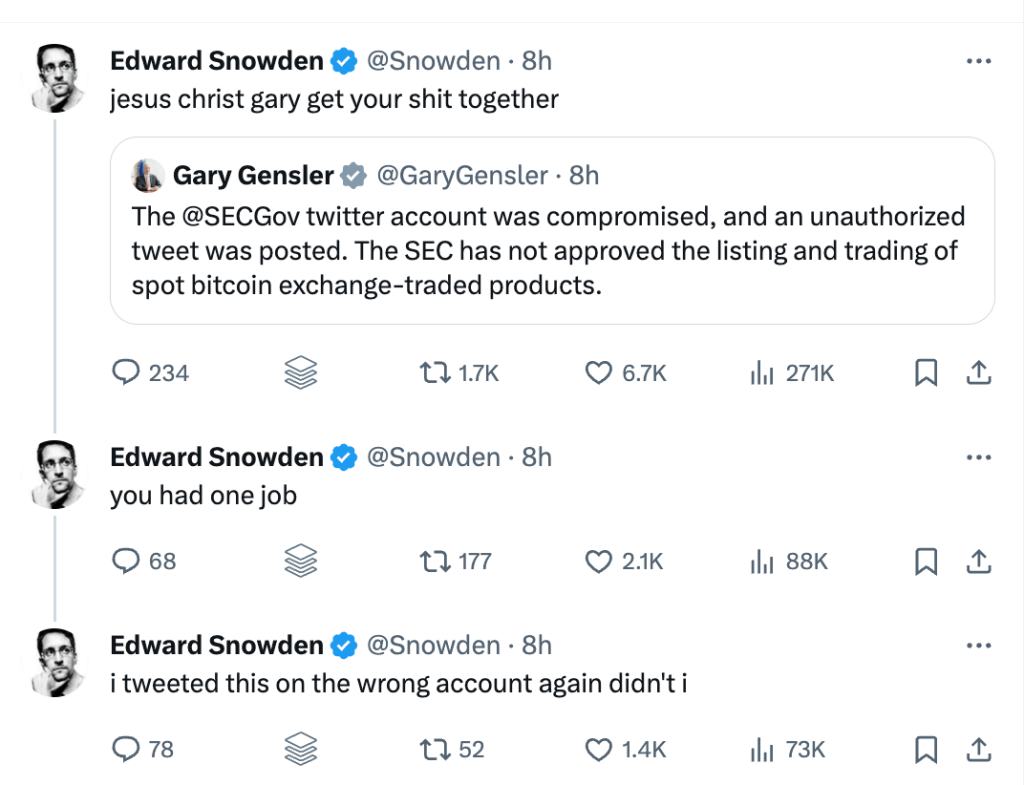After gaining control of the SEC’s account, hackers posted tweets claiming that the agency had approved the listing and trading of spot Bitcoin ETFs on all registered national securities exchanges.
The U.S. Securities and Exchange Commission (SEC) X (Twitter) handle, @SECGov, falsely announced Bitcoin ETF approval on Tuesday, one day before its expected decision, causing widespread misinformation.
The tweet caused panic and excitement in the cryptocurrency market since the hackers claimed that the SEC had approved the listing and trading of spot Bitcoin ETFs on all registered national securities exchanges. The fake tweet raised Bitcoin’s price by nearly 10%.
The agency later confirmed that its X account had been hacked. The unauthorized post, which was up for about 30 minutes, has since been deleted.
For your information, the U.S. Securities and Exchange Commission (SEC) is a federal regulatory agency responsible for overseeing and regulating the securities industry, including securities exchanges, securities brokers and dealers, investment advisers, and various investment funds and products. The SEC’s primary mission is to protect investors, maintain fair and efficient markets, and facilitate capital formation.
Financial markets have long been awaiting news of the agency approving spot Bitcoin ETFs to allow U.S. investors to trade the cryptocurrency as shares on major exchanges. Although there was speculation that the agency would approve the close of markets on Wednesday, a surprise tweet from the official SEC account seemed to announce the green light.
However, SEC Chair Gary Gensler revealed on his personal Twitter account that the agency was hacked and the tweet was not posted by the SEC.
“The @SECGov Twitter account was compromised, and an unauthorized tweet was posted. The SEC has not approved the listing and trading of spot bitcoin exchange-traded products,” Gensler’s tweet read. The agency also posted its statement on X, confirming that it has not approved the trading.
For insights into the incident, we reached out to Jake Moore, Global Cybersecurity Advisor, ESET, who stated “This proves that accounts on X continue to be targeted and if an official account is compromised then serious consequences can follow. Cryptocurrency scams remain the focal point and with social pressure on X, they can still reap huge gains.”
Jake warned that “Legitimate third-party access compromise or targeted social engineering are still the most common ways to obtain access to an account which leaves the security onus very much on individuals. Therefore, even more significance should be directed at training staff and account owners especially when dealing with high-profile accounts.”
The SEC has long fought the approval of the Bitcoin ETF due to potential market manipulation. After Grayscale’s victory in a lawsuit in August, the agency reconsidered applications as major players like BlackRock were now a part of it.
Whistleblower Edward Snowden criticized Gensler after the hacking as it led to disseminating false information misleading millions. He mocked the agency’s security lapse in a series of tweets including terms like “Jesus Christ gary get your s*** together” and “you had one job.”
The fake post gathered more than 2.7 million views before its deletion, leading to high-profile finance media outlets on X reporting it. However, Gensler’s tweet explaining the compromise of SEC’s X account and refuting ETF approval garnered over 7.5 million views and dispelled the fake news effectively.
Despite Gensler’s retraction, the SEC is expected to approve applications for Cathie Wood’s ARK as it has to decide. Nevertheless, the incident has sparked discussions about the reliability of online information, particularly from government sources and the security of their social media platforms.
RELATED ARTICLES
- Hacker found using Twitter memes to spread malware
- Researcher logs into Trump’s Twitter with password MAGA2020
- Pink Drainer Posed as Journalists, Stole $3M from Twitter Users
- British Military’s Twitter Accounts Hacked to Scam Crypto Users
- A child sent out a gibberish tweet from US Nuclear-agency account



